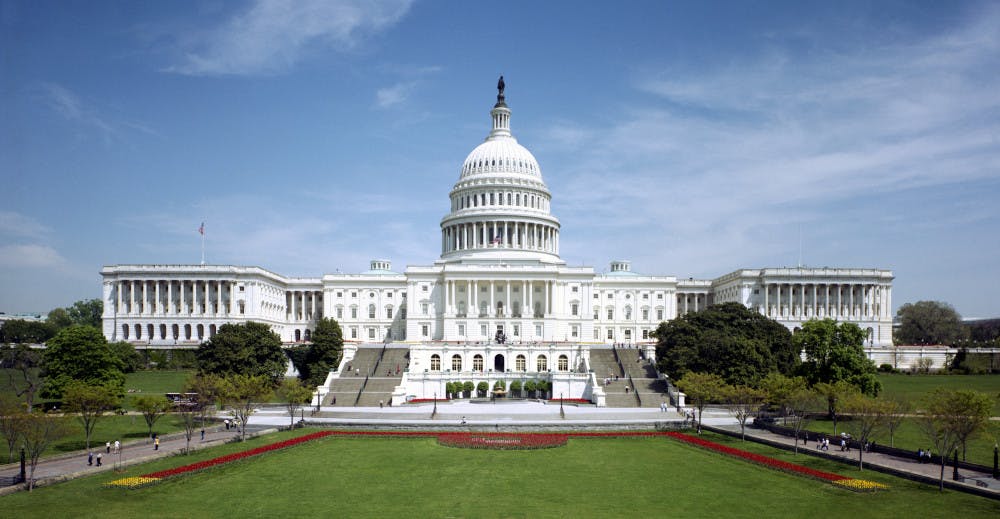For the last year, I have struggled to come to terms with how someone with a long history of denigrating and objectifying women could rise to the highest office in the land. President Trump has bragged about sexually assaulting women on camera; commodified and disrespected women — including teenage girls — when he was owner of the Miss Universe Organization; and allegedly harassed or assaulted 16 women since the 1970s. Each of these accusations should have been disqualifying for any office, let alone the presidency. So how could voters know all of this and still elect him? How could the American political system lack a check against the election of abusive men?
Well, the discourse around recent sexual assault allegations involving other politicians could offer a clue. With the emergence of the #MeToo campaign, many more political figures have been accused of sexual harassment and misconduct, including former President George H.W. Bush, U.S. Senate candidate Roy Moore and now U.S. Senator Al Franken, D-Minn. Yet their supporters have generally condoned their behavior and politicized sexual assault. In this context, Trump isn’t an exception — he is the product of a system that has consistently excused the transgressions of powerful men.
Even before Trump, several formal presidents have been credibly accused of sexual assault or misconduct — and have been forgiven by the public thereafter. Thomas Jefferson reportedly raped Sally Hemings, an enslaved woman and his teenage daughter’s companion, for years. Today, his face is carved onto the side of Mount Rushmore and cast on our currency. Grover Cleveland allegedly raped the mother of his child, Maria Halpin, according to an affidavit she filed at the time. Today, he is known as “Grover the good” and “the most honest president of them all.” And Ronald Reagan was accused of date-raping actress Selene Walters in the 1950s. He is still remembered fondly by Republicans — and even many Democrats — as one of the most popular presidents in modern history.
Then, of course, there is Bill Clinton, accused of assaulting four women and engaging in an inappropriate sexual relationship with an intern who worked under him. Despite tale after tale of misconduct, liberals were quick to come to his defense and vilify the women who spoke out against him. Today, he is still considered a Democratic icon and — incredibly — a champion for women’s rights. So, by all accounts, we have sent many exploitive and abusive men to the White House before Trump — we have just refused to acknowledge it.
This culture of impunity extends well beyond the White House. Last week, over 50 congressional staffers came forward to accuse male lawmakers of sexual harassment. Female staffers allegedly kept an informal “creep list” of the most notorious men and claimed that the power dynamic between aides and legislators discouraged women from speaking out. Even worse, Congress has paid out potentially millions of dollars in settlements to survivors of sexual harassment and discrimination at the hands of lawmakers. The fact that taxpayer money has actually been used to shield legislators from the consequences of their actions — and in many cases, buy the silence of women — is a testament to just how complicit our political system is.
And this isn’t just a problem with national politics. Similar stories have emerged from state legislatures across the country, including in Rhode Island. Last month, R.I. Rep. Teresa Tanzi ’07, D-Narragansett and South Kingstown, alleged that senior state legislators offered to support her bills in exchange for “sexual favors.” Lawmakers in other states, including Massachusetts, Texas and Minnesota, have also experienced rampant objectification, harassment and discrimination. At every level of our political process, we have allowed sexual misconduct to continue unchallenged — and we now have to live with the results.
It is encouraging that policymakers are finally beginning to take action against sexual harassment in politics, both nationally and at the state level. But if we truly wish to address sexual misconduct in the highest echelons of our democracy, we need to first confront the complicity of a system that has continuously shielded powerful men from the consequences of their actions. We are long overdue for such a reckoning, because this problem is more than just about Trump, Moore, Clinton or any other contemporary political figure that comes to mind. It’s about a political culture that has neglected sexual violence and silenced women for centuries. Until we recognize that, any policy solution will be little more than a Band-Aid over a gaping wound.
Mili Mitra ’18 can be reached at mili_mitra@brown.edu. Please send responses to this opinion to letters@browndailyherald.com and other op-eds to opinions@browndailyherald.com.





